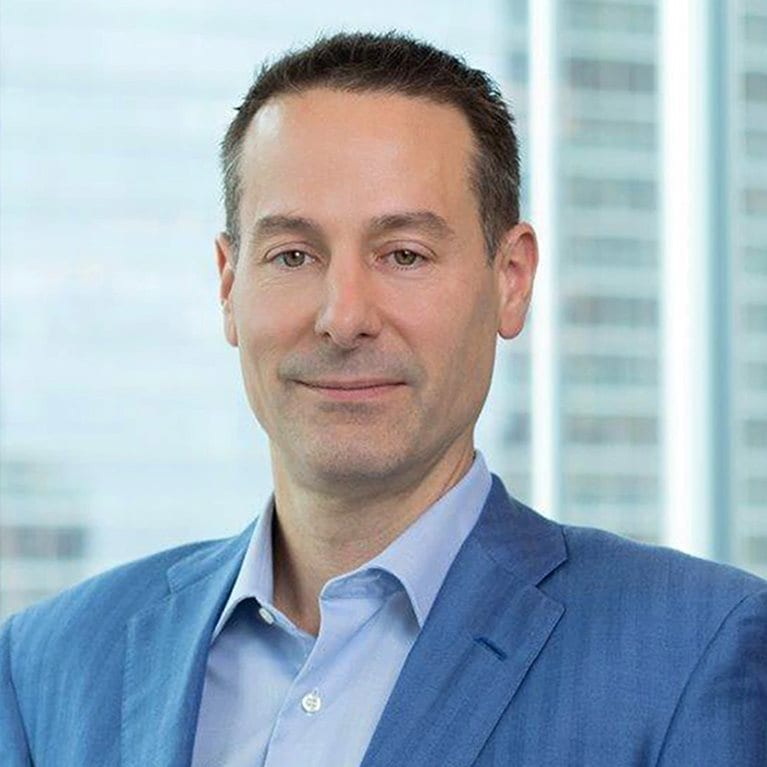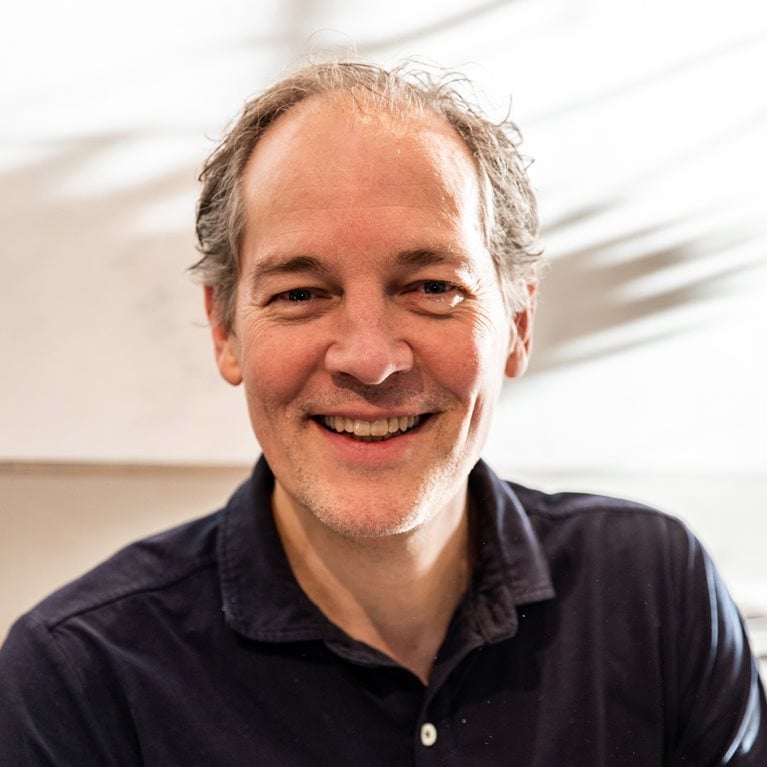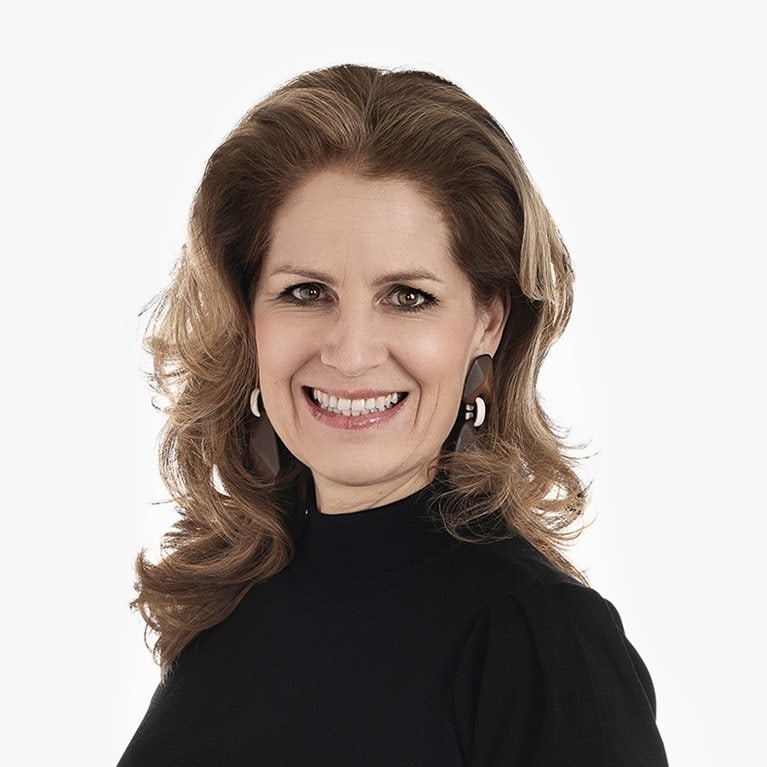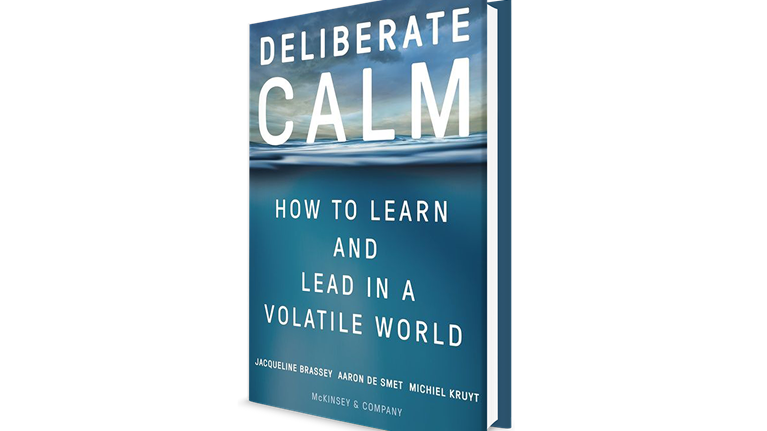In this edition of Author Talks, McKinsey Global Publishing’s Mike Borruso chats with McKinsey senior knowledge expert Jacqueline Brassey, senior partner Aaron De Smet, and former partner Michiel Kruyt, the authors of Deliberate Calm: How to Learn and Lead in a Volatile World (Harper Collins, November 2022). Whether it’s personal turbulence or a crisis at work, Brassey, De Smet, and Kruyt have discovered that extraordinary leaders succeed through volatile times by demonstrating “deliberate calm”—a practice of adaptive, intentional choice that anyone can develop by embracing what was once regarded as “soft” stuff: self-awareness, emotional intelligence, and mindfulness. An edited version of the conversation follows.
Why did you write this book?
Aaron De Smet: COVID hits, we’re stuck, and I’m working from home. I thought, “OK, I can’t visit clients the way I had planned to.” At the time, I was leading our leadership service line with a friend and colleague named Gemma D’Auria. Gemma and I said, “This unique time is going to call for some extraordinary leadership, and there’s something we can probably learn from past crises like this one.”
It just so happened that in December of 2019, prior to the pandemic, I had been speaking at a roundtable event with a bunch of people about resilience. One of the other presenters there was a Harvard professor named Dutch Leonard. When we were talking, he said, “There are different types of crises.” Of course, we didn’t know one was right around the corner.
This unique time is going to call for some extraordinary leadership, and there’s something we can probably learn from past crises like this one.

There are what he calls “routine emergencies,” and then there are other crises which are those that have such a high level of uncertainty that they are unlike other crises. We are not prepared. We do not know what to do. There are so many unknowns in this situation that this is a landscape crisis of uncertainty. He said, “That requires something different.”
When this came up, I said, “Gemma, if we’re going to write about the extraordinary leadership that is going to be required, we have to understand what to do in crises where there’s a high degree of volatility and uncertainty and we don’t know how long it will last, what it will mean, or how bad it will be.” There are so many unknowns in that kind of scenario that that’s a different kind of leadership.
We wrote an article called “Leadership in a crisis.” We got a team of researchers together to help us figure this out, and we identified five things that leaders should do in a crisis to navigate, to adapt, to learn, to figure out what they need to do—and one of the five things was deliberate calm. This article was very successful, and a lot of people had a lot of questions, so I called Michiel and Jacqui.
I asked, “Would you two be willing to write a deep-dive article on one of the five things, deliberate calm?” They were both very excited. They each said, “I have so many ideas—I’ve even started writing a book on this.” And I said, “Well, that’s wonderful, but we can’t really wait for that. Leaders need this article right now.”
So they wrote a brilliant article. It was wonderful. They both said, “We enjoyed working with each other on this article so much. I don’t know if you know, but we were also writing a book, and we want to work on this book together. Can you help us navigate that?” And I said, “I’m happy to.”
Jacqueline Brassey: This was a wonderful and beautiful way of people coming together at the right moment, at the right time. I’ve already been writing over the years about topics like emotional flexibility and the neuroscience of stress, well-being, and confidence.
I have coauthored with Aaron before on the area of adaptability, and with Michiel, I’ve been working on top-team effectiveness with clients. We knew each other, but all three of us were not yet collaborating. Then, something happened in the pandemic. There was a natural moment where we all touched base again, and there was also an increasing interest in the topic of adaptability and stress management. Along the way, we found each other again.
All of us bring a different background. Michiel brings his personal story but also his many years of top-team effectiveness work. Aaron is a social psychologist who’s done similar work with clients but comes from a slightly different angle, and then I bring in a lot of the neuroscience and psychology behind this topic. When we started talking, the idea turned into something more concrete, and that became a wonderful journey of co-creation.
Michiel Kruyt: Working with Jacqui and Aaron was fun because when you’re writing a book with three people, sometimes it’s a bit challenging because you need to align, but most of the time, it makes the content discussions sharper and better than when you are dialoguing on your own. It was a lot of fun. I’ve spent 15 years in executive boardrooms doing this work, so I have a lot of pattern recognition, experience, stories, and situations that found their way into the book.
What is deliberate calm?
Aaron De Smet: If I had to distill the book down to one big takeaway, it would be learning how to change when change is hard. Deliberate calm is a personal tool kit to help leaders learn, change, and adapt when it’s the most important and hardest. It draws on a number of related concepts: self-awareness, situational awareness, emotional self-regulation, and emotional intelligence.
If I had to distill the book down to one big takeaway, it would be learning how to change when change is hard. Deliberate calm is a personal tool kit to help leaders learn, change, and adapt when it’s the most important and hardest.
It puts them all together and combines it with creativity, adaptability, and learning agility in a very simple, practical way of figuring out when I need to change and how I need to change. It helps me change how I see and behave in the world, it helps me unlearn my old habits and reactions, and it helps me invent the new ones that are going to serve me well for the challenge or opportunity in front of me.
Michiel Kruyt: Are you in a situation where the challenge you’re facing requires you to be adaptable, or can you solve it with things that have worked for you before? That distinction is a very important distinction, and it’s very helpful for people to determine if they can solve this situation with old answers or if they need to develop and be open for new things to emerge.
We’re biologically wired to grasp onto old, successful formulas that worked for us in the past, and that’s actually why a lot of change initiatives fail. We don’t recognize that our biological wiring is steering us to old answers instead of allowing us to be selective, to open up to discovering new things, and, therefore, to find the new solutions for the challenge at hand.
We’re biologically wired to grasp onto old, successful formulas that worked for us in the past, and that’s actually why a lot of change initiatives fail.

Aaron De Smet: Occasionally—for example, if you step off of a curb and a bus is coming at you—you will benefit from just jumping without thinking, but those situations are rare. Most of the time, the crises we are facing benefit from you saying, “Let me take a deep breath, let me think, let me pause, let me take stock.” This is where dual awareness comes in. I take stock of the situation and of myself, and I link those two.
That is one part of deliberate calm, and the only way to do this is to be calm, even when everything around you is telling you to freak out. It turns out that just a few seconds of that calm, of taking stock, can make a huge difference. It doesn’t need to be hours at a time before you react. It could be just a few tenths of a second, and this has been shown to help people make better decisions.
Why do we say “deliberate”? Because if you’re not deliberate about it you will probably freak out. I need to be very deliberate in knowing that I’m in a chaotic situation, knowing the stakes are high, knowing there’s a lot of uncertainty, and then deliberately calming myself down and taking stock.
Be calm, even when everything around you is telling you to freak out. It turns out that just a few seconds of that calm, of taking stock, can make a huge difference.
How does one practice deliberate calm?
Jacqueline Brassey: What most people are not always aware of is that there are a lot of cues in your body already that indicate something may not be right. The first step is becoming aware of what is happening to you when you are at your best, when you are performing less well, and when you are under pressure, and understanding the things you do as a result and the things that you feel. What are the cues? What are the triggers?
You can do that by looking back—learning by reflecting on your day—but also by looking ahead of the day. It depends basically on where you feel pain in normal life. What happens in those stress moments? What are you thinking, what are you doing, and what are you feeling? When you start doing this, you gradually start becoming more aware in the moment.
The first step is becoming aware of what is happening to you when you are at your best, when you are performing less well, and when you are under pressure, and understanding the things you do as a result and the things that you feel.

Right now, in this moment, as I’m being interviewed, I’m very much aware that I’m a little bit positively tense. Sometimes you feel a little bit of tension in the body, which is a positive thing, but if that tension becomes extreme, then you cannot perform well, or you may say something that you regret afterward.
Becoming aware of those moments where you feel tense is step one. From there on, you can become more proactive, and you can also learn the skills to pivot.
Michiel Kruyt: Awareness is skill number one. We have a number of practices in the book that are helpful for developing your awareness. Personally, the most important one is listening to my emotions. For me, the emotional trigger of anxiety typically is a signal that my challenge is moving into the adaptive zone, which is a warning sign that I may try to get out of this zone quicker than it takes me to find the right solution.
The second skill is acceptance. Very often, when you are in a situation that is hard to manage and you need to learn new things, there are other stakeholders involved. Very often, you may think, “If only they would change, I wouldn’t need to manage this situation.”
There needs to be acceptance about things as they are, acceptance about the situation, and acceptance about the role you play in it. Only then can you make the choice to say, “I’m taking control of this, and I’m going to bring the right people together to learn and find the right solution.”
What are your deliberate calm practices?
Jacqueline Brassey: I run. People find walking very helpful. It’s about moving your body, making sure you eat well, and making sure you sleep well. Regularity and consistency are important for your well-being. When you get to week three or week four of the protocol that we propose at the end of our book, you can start experimenting with difficult situations, and we guide the reader through that.
Whether there is a particular thing that matters to you, or you want to change a particular behavior, or you want to learn something new, or you want to engage in something difficult that you never did before, you can start practicing in relatively safe settings with lower stakes, and then you can move up the stakes and start experimenting with that. When it goes wrong, use the skills that we also provide in the book to deal with it.
It’s about having a growth mindset, self-compassion, and kindness. I practice those. One of the things that I personally do is watch my sleep. I work on reframing that and on exercise, mindfulness, and meditation, as well. Be kind. You will make mistakes, and that is an important part of deliberate calm, as well. You have to make mistakes to learn.
Be kind. You will make mistakes, and that is an important part of deliberate calm, as well. You have to make mistakes to learn.
Michiel Kruyt: When I first got confronted with my thyroid condition, I didn’t really know about deliberate calm. At the time, I started a couple of practices that are actually in the book now. The most important one was getting very, very aware of my emotional responses. I did that in a couple of ways.
I learned to listen to my tone of voice and other people’s tone of voice. I learned to listen for if the tone is filled with stress or if it’s a relaxed tone, which shows me if I am in a learning mode or protection mode when I’m talking. For example, when I hear myself say, “I’ve got it,” it feels like a protection state. I immediately say, “There’s something that triggered me.”
I got much more aware of my inner state, and I started to shift my paradigm to the belief that I am the only one who can choose my response to whatever situation is being thrown at me. I stopped blaming other people. I stopped blaming the environment. I stopped blaming challenges. It’s a hard practice, and I’m still practicing it.
What does it mean to ‘recover like an athlete’?
Aaron De Smet: We talk about recovering like an athlete because learning new things is hard, changing behavior is hard, and even being aware of what’s getting in the way is hard. These hard things take emotional and cognitive resources. After you’ve had a hard time, whatever that is—a long day at work, a crisis that you navigated, a tough situation at home—the only way you replenish those resources is recovery.
Athletes have all kinds of creative ways to recover. You see them getting massages, getting in warm baths, using ice baths, taking naps, spacing out meals, and spacing out downtime. It’s all a very intentional way to build in that recovery. What we’re saying is, if you’re going to be the one guiding this ship for this team or this organization, you have to recover like an athlete.
These hard things take emotional and cognitive resources. After you’ve had a hard time, whatever that is—a long day at work, a crisis that you navigated, a tough situation at home—the only way you replenish those resources is recovery.
Your recovery might be less physical, but it’s emotional, it’s mental, and it’s even spiritual. People need to be connected to what gives them a sense of meaning and purpose or they’re not going to be their best selves when it comes to pivotal leadership moments.
Jacqueline Brassey: There are always a million reasons to continue working. Your email will never stop. There is no office closure anymore because business is basically 24 hours. We always have access to information and to the whole world, basically. So there’s no structure in our lives that takes care of recovery in a natural way.
The old office closings, the going home, that doesn’t exist anymore. We know that, and so you have to become very intentional about recovery, because otherwise you’re depleting your resources, and you set yourself up for failure.
What are dual awareness and the adaptability paradox?
Aaron De Smet: One of the primary concepts in the book is dual awareness: the linking of situational awareness and self-awareness. Self-awareness is understanding my own preferences, my own tendencies, my own strengths and weaknesses, and my own reactions to things—my habitual responses.
I also understand what the situation is and what it’s probably calling for. This allows me to have choice in how I want to respond and react, and if I want to interrupt my normal habitual response or not. In some cases my habitual response is exactly what I want. Under pressure, we are more likely to go on autopilot. Our tendencies, our natural reactions, our natural habits are more likely to come forth quickly when under pressure.
The problem is, what if you need creativity? Pressure tends to limit that, and here’s the challenge: more and more of the problems we face in business, life, and society are ones where the answer isn’t obvious. It requires creativity, it requires new thinking, it requires learning, and more and more, we’re under pressure. For example, there is the pressure to figure out climate change.
Solving climate change is going to be hard. It’s going to require novel solutions. It’s going to require creative thinking. The more pressure we get to solve it, the more motivated we are to solve it. But the flip side is that it makes it harder for us to solve it. This is the conundrum. It’s what we call the “adaptability paradox.” It’s hard to adapt, it’s hard to change, it’s hard to see things in new ways.
Our natural habits are more likely to come forth quickly when under pressure. The problem is, what if you need creativity? Pressure tends to limit that, and here’s the challenge: more and more of the problems we face in business, life, and society are ones where the answer isn’t obvious.
How does deliberate calm work in a team setting?
Jacqueline Brassey: It’s fascinating. You have to deal with yourself, and in interaction with others it becomes even more complicated. There are three things that drive how you feel in a moment. One is your physiology, your state of being, and that’s why I said before that it’s important to be rested and take care of yourself.
The second thing is your concepts: whatever you’ve learned and what you’ve brought in your backpack throughout your life. It starts immediately at birth, and maybe even before birth. The third thing is context. Social context is extremely important to how you feel and respond because it provides cues, and it also gives you information on whether you’re safe or not safe.
That impacts how you as an individual are responding and behaving, but only a little bit of this is visible to the outside world. A lot of it is happening internally. At a team level, we see behavior from others and we often assume that specific behavior must mean that something else is going on inside the person, but we don’t know. In teams, this interaction becomes more complicated.
My behavior may trigger a response in somebody else without me knowing. I may not intend to have a specific response to another person, but because that person brings a certain history—and maybe a bad experience with somebody else who said the same thing as I’m saying now—then maybe your reaction subsequently triggers that person.
If you’re a leader, this is more critical. It’s often underestimated how much impact you have as a leader on the dynamic of a team and on all individuals, depending on how strong the hierarchy is in an organization.
Verbal and nonverbal cues impact others. We talk in the book about a domino effect, about what the leader says and how it impacts others, and also what then comes back. In a team setting, you have a lot of degrees of freedom, because a lot can happen in that interaction. As a leader, you create a context in which people may feel safe or unsafe, and safety in the context of deliberate calm is very important.
What kind of impact can deliberate calm deliver?
Aaron De Smet: In all the cases that I’ve been involved with where there has been a true transformation, I have seen two things happen. Number one, people changed, and they changed with these tools.
They may not have called it deliberate calm, but they did the things that are underlying it: situational awareness, self-awareness, emotional self-regulation, and learning agility—those “ahas” and unlocks that go “Ah, I’ve got to fundamentally change how I approach this in order to consistently behave differently to drive the performance and achieve the outcome I want.” That always happens.
The other thing that, in my experience, almost always happens is that there are some influential leaders who aren’t able to change and need to be removed from their roles. I’ve never seen a successful transformation where both of those things didn’t happen. To me, the deliberate calm tool kit is part of that unlock.
In most of these transformations that I’ve seen, there’s also a sense of urgency. The great thing about a burning platform is that it galvanizes people. It motivates people. It lights a fire, if you will. Pressure often makes it harder to do new things, to learn new things, and to adopt new ways of working and leading. This is the tool kit that lets you do both. It lets you turn up the pressure, even in cases of great uncertainty, and learn new ways of working.
Pressure often makes it harder to do new things, to learn new things, and to adopt new ways of working and leading. This is the tool kit that lets you do both. It lets you turn up the pressure, even in cases of great uncertainty, and learn new ways of working.
Jacqueline Brassey: When I started to research this many years ago, what surprised me and what really made a difference when I talked to clients is that this is science. This is not soft. This is biology. It’s neuroscience, it’s psychology, and it can be explained in a scientific way that helps people open up to it.
It’s changing now, but the topics that we describe in the book—but in the past—were often looked at as soft topics for people who struggle with stress, which is stigma. It’s not soft—it can really be explained by science. Our book is evidence-based, and there’s a lot of research behind it.
We focus on organizational settings and leadership development, but this book is relevant for any setting—not only the working context. Whether it’s at work, at home, at school, or in whatever context you find yourself, deliberate calm dynamically adjusts itself because it is subjective. The principles can be used in any context.
Whether it’s at work, at home, at school, or in whatever context you find yourself, deliberate calm dynamically adjusts itself because it is subjective. The principles can be used in any context.
That is the core of this book: the fact that deliberate calm looks at the inner world, the outer world, the context, and the dynamic between those.


